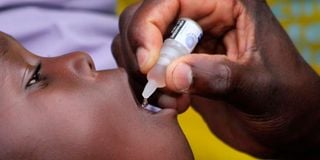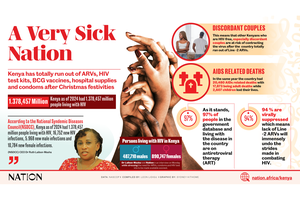Relief as Kenya restores vital vaccine supply after three-week crisis

A health officer administers polio vaccines to a five-year-old child in Nairobi.
Kenya has ended a three-week vaccine stockout with the distribution of 2.3 million doses of BCG and seven million doses of Measles-Rubella vaccines across regional depots, the Ministry of Health announced Wednesday, January 22.
The distribution follows what officials described as a global procurement delay that had threatened the country's routine immunization program.
Director-General of Health Dr Patrick Amoth detailed the nationwide distribution plan, with Nairobi receiving the largest allocation of doses, 450,000.
"We've strategically distributed these essential vaccines across our regional depots to ensure maximum coverage," said Dr Amoth during a briefing in Nairobi.
The distribution breakdown shows Kisumu depot receiving 300,000 doses, Eldoret 290,000 doses, Kakamega 276,000 doses, and Nakuru 264,000 doses.
Coastal and northeastern regions, served by Mombasa and Garissa depots, each received 120,000 doses, while Meru and Nyeri counties were allocated 90,000 doses each.
Also Read: End child vaccine shortages
"During the shortage, we had to reschedule numerous newborn BCG vaccinations. This created anxiety among new mothers and disrupted our immunization schedules," said a nurse at a local hospital.
The Ministry has retained 234,000 doses as buffer stock, a measure public health experts say is crucial for preventing future shortages.
"Maintaining buffer stock is essential for managing supply chain disruptions," noted Dr Amoth.
“It’s now up to caregivers to bring their children for vaccination as scheduled."
Looking ahead, the Ministry expects additional vaccine shipments in the coming weeks. These include 2.3 million doses of Tetanus Diphtheria vaccine and 486,000 doses of Rotavirus vaccine, crucial for preventing severe diarrhea in young children.
A shipment of 960,000 doses of oral polio vaccine is scheduled to arrive early next month.
Medical Services PS Harry Kimtai, who had earlier attributed the stockout to global procurement delays, urged county governments to ensure timely collection and distribution to health facilities.
"We've resolved the supply issues, but successful immunization depends on efficient last-mile distribution," said Mr Kimtai.
Meanwhile, Kenya's new Social Health Authority (SHA) scheme has reached a significant milestone, with 18 million Kenyans now enrolled in the program that replaced the National Health Insurance Fund (NHIF).
Also Read: Get children’s vaccine
Public Health Principal Secretary Mary Muthoni announced that the gender ratio of registrations shows equal participation between men and women, marking a departure from historical patterns where men dominated health insurance registration.
The means-testing tool, applied to 2.5 million Kenyans, has established an average household contribution of Sh602 per month (Sh7,224 annually).
This will be above the Sh300 minimum contributions President William Ruto had said will apply to the poorest contributors.
However, Dr Amoth highlighted a critical gap in dependent registration.
"Many beneficiaries are only registering dependents at the point of seeking care, causing unnecessary delays in service delivery," he explained.
"We urge all principal beneficiaries to proactively register their dependents to ensure seamless access to healthcare services."
The scheme has enrolled 8,722 health facilities nationwide, representing 54 per cent of eligible facilities.
Private hospitals have submitted claims totaling Sh8.5 billion, while government facilities have claimed Sh4.8 million.
Regional analysis shows Kisii leading with claims worth Sh770.3 million, followed by Kisumu (Sh649.7 million), Kiambu (Sh621.5 million), and Homa Bay (Sh521.7 million).
The SHA platform has processed 302,400 pre-authorizations, predominantly from Level 4 and Level 5 facilities.
Addressing growing concerns about the benefits package, Dr Amoth announced plans to establish a Benefits Package and Tariffs Advisory Panel (BPTAP).
"This independent panel will provide expert advice on package revisions, new coverage options, tariff adjustments, and program monitoring," he said.
Healthcare providers have reported mixed experiences with the new system, with many, including patients, reporting delays and downtimes.
The Ministry has urged the more than four million former NHIF members to update their profiles on the SHA platform.
"Profile updates are crucial for ensuring uninterrupted access to healthcare services," PS Muthoni emphasized.
Consumer advocacy groups have called for greater transparency in the benefits package and clearer communication about coverage limits.
"We're receiving complaints from members who paid their contributions but face challenges accessing services," said John Otieno, head of the Healthcare Consumers Association.





